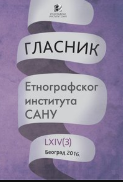Југословенски/српски клубови у Бечу у историјском контексту
Yugoslav/Serbian Clubs in Vienna in the Historical Context
Author(s): Miloš RašićSubject(s): Cultural Anthropology / Ethnology, Post-War period (1950 - 1989), Migration Studies, Identity of Collectives
Published by: Етнографски институт САНУ
Keywords: migrations; Yugoslavs; Serbs; clubs; Vienna;
Summary/Abstract: The migrations from Yugoslavia after the Second World War, which are of importance for this paper, started as early as in the 1950s, got more and more complex, and became the key socio-political and economic process. Leaving for West-European countries where they later settled permanently, the migrants were developing the new cultural context in which they live even today. In this paper, I will focus on the Serbs who settled in Vienna, Austria. Having moved into the new, unknown area, where they did not know the language or the cultural context well enough, the Yugoslavs started forming a place around which they would gather together and the place which they would use for the connection and identification with the mother country. Thus, in the 1970s, in Vienna, the Yugoslavs organized themselves and formed their first clubs. In this paper, my aim is to get an insight into the historical context of the beginnings and the development of these Yugoslav clubs, which, following the conflict national ideologies in their mother countries, started dividing on the national basis during the 1980s after which today’s national-ethnic clubs (Serbian, Croatian, Bosnian etc.) appeared. In the end, I will try to make a short summary, in diachronic terms, of the operating policy and the representation of primarily Serbian clubs, since I cover their policies in my field research, and thus make this paper the basis for further and wider research related to this topic
Journal: Гласник Етнографског института САНУ
- Issue Year: LXV/2017
- Issue No: 3
- Page Range: 687-703
- Page Count: 17
- Language: Serbian

